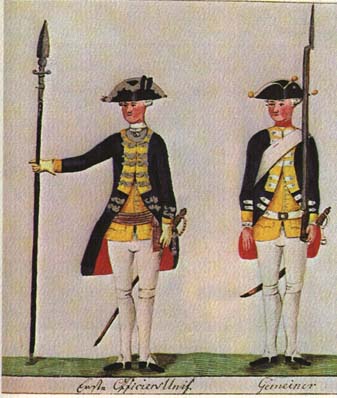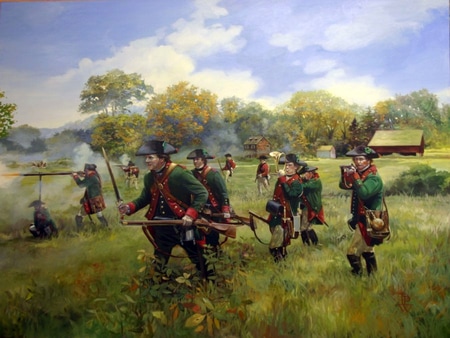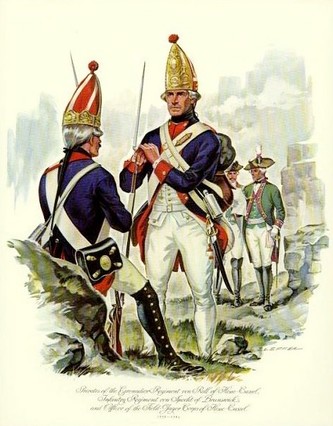Hessians
 Hessian Soldiers, Wikimedia Commons
Hessian Soldiers, Wikimedia Commons
Although the British had one of the most powerful militaries in the world at the time, they were in need of more troops. In terms of numbers, the British merely had about 50,000 troops; in comparison, France had 160,000 soldiers and Austria about 150,000 men. The Seven Years War and French and Indian War took a huge toll on the British army, as many lives and supplies were lost. The British had difficulty recruiting more troops from their own country. In desperation, Britain sought to hire soldiers from other countries. When Britain asked Empress Catherine of Russia to provide Russian soldiers, she refused. Eventually the British arranged to hire troops from some German states, including Hesse-Cassel.
The British and German leaders negotiated treaties in 1776 in which nearly 30,000 troops would be sent in the British Army from German states. The first German leader involved in such bargaining was Charles of Hesse-Cassel. These leaders would often send troops to the British merely to procure more money. On the British side, there was some opposition to these treaties, with claims that it was inhumane to sell humans. Yet, most British were of the same opinion as the British Prime Minister Sir Frederick North, who claimed that employing the Hessians was necessary to crush the American rebels.
One notable German dealer was the Landgrave of Hesse-Cassel. He was able to provide about 16,000 troops for the British army in exchange for three million pounds. Part of the deal was formulated in such a way that he would receive even more money when German troops died. Through the Landgrave, one can clearly see that the sale of Hessians soldiers was more of an exploitation of soldiers through which political leaders, such as the Landgrave, profited. There are even reports that some Hessians were forced against their will to join the British army.
Eventually, even among the German troops, princes of German states began to have difficulty recruiting qualified soldiers. These princes had already shipped off most of their best men, probably because they did not expect the war to last several years. Many of the German men who remained available were simply too old or unfit to fight. Even the German Jägers, more professionally disciplined soldiers, the British found not to be as well trained. This lack of skill and training may have contributed to the negative opinion that British held of Hessian troops that they were dirty and uncultivated.
The initial opinions that the Hessians and Americans had of each other were not so positive either. Coming from relatively poor German states, the Hessian soldiers found the Americans to be too consumed by their wealth. Hessian officers looked down upon American troops, who were merely an amalgam of various professions, such as bankers, tailors or bakers. On the other hand, Americans preconceived that the Hessians were savages. Over time, however, these opinions changed. Hoping to procure more troops, Congress and Washington encouraged attempts to try to bring Hessians troops over to the Continental army, as many were reluctant to fight for the British.
One notable episode of the Revolutionary War involving the Hessian troops was the Battle of Trenton, at which George Washington defeated Hessian soldiers in a surprise attack. It was winter time and George Washington was aware that the term of service for many of the Continental soldiers expired on December 31. Thus, Washington decided to cross the Delaware River and attack the Hessian encampment on Christmas Day, when they were least expecting it. With many Hessians still sleepy and drunk, the Americans were able to seize a solid victory with minor losses and the Hessians surrendered.
Despite the fact that the Hessians did not help the British defeat the Americans, they contributed to the complicated dynamics of the American Revolution. German troops assisted the British in all the major battles since their arrival in the Americas. Some British would blame the Hessians for their loss of the war. At the end of the war, many Hessian soldiers would eventually settle in the surrounding regions in Pennsylvania, New Jersey and Maryland, while others would return back to their homeland.
The British and German leaders negotiated treaties in 1776 in which nearly 30,000 troops would be sent in the British Army from German states. The first German leader involved in such bargaining was Charles of Hesse-Cassel. These leaders would often send troops to the British merely to procure more money. On the British side, there was some opposition to these treaties, with claims that it was inhumane to sell humans. Yet, most British were of the same opinion as the British Prime Minister Sir Frederick North, who claimed that employing the Hessians was necessary to crush the American rebels.
One notable German dealer was the Landgrave of Hesse-Cassel. He was able to provide about 16,000 troops for the British army in exchange for three million pounds. Part of the deal was formulated in such a way that he would receive even more money when German troops died. Through the Landgrave, one can clearly see that the sale of Hessians soldiers was more of an exploitation of soldiers through which political leaders, such as the Landgrave, profited. There are even reports that some Hessians were forced against their will to join the British army.
Eventually, even among the German troops, princes of German states began to have difficulty recruiting qualified soldiers. These princes had already shipped off most of their best men, probably because they did not expect the war to last several years. Many of the German men who remained available were simply too old or unfit to fight. Even the German Jägers, more professionally disciplined soldiers, the British found not to be as well trained. This lack of skill and training may have contributed to the negative opinion that British held of Hessian troops that they were dirty and uncultivated.
The initial opinions that the Hessians and Americans had of each other were not so positive either. Coming from relatively poor German states, the Hessian soldiers found the Americans to be too consumed by their wealth. Hessian officers looked down upon American troops, who were merely an amalgam of various professions, such as bankers, tailors or bakers. On the other hand, Americans preconceived that the Hessians were savages. Over time, however, these opinions changed. Hoping to procure more troops, Congress and Washington encouraged attempts to try to bring Hessians troops over to the Continental army, as many were reluctant to fight for the British.
One notable episode of the Revolutionary War involving the Hessian troops was the Battle of Trenton, at which George Washington defeated Hessian soldiers in a surprise attack. It was winter time and George Washington was aware that the term of service for many of the Continental soldiers expired on December 31. Thus, Washington decided to cross the Delaware River and attack the Hessian encampment on Christmas Day, when they were least expecting it. With many Hessians still sleepy and drunk, the Americans were able to seize a solid victory with minor losses and the Hessians surrendered.
Despite the fact that the Hessians did not help the British defeat the Americans, they contributed to the complicated dynamics of the American Revolution. German troops assisted the British in all the major battles since their arrival in the Americas. Some British would blame the Hessians for their loss of the war. At the end of the war, many Hessian soldiers would eventually settle in the surrounding regions in Pennsylvania, New Jersey and Maryland, while others would return back to their homeland.
(N.B., please find sources and footnotes in digitized copy on Home Page.)


